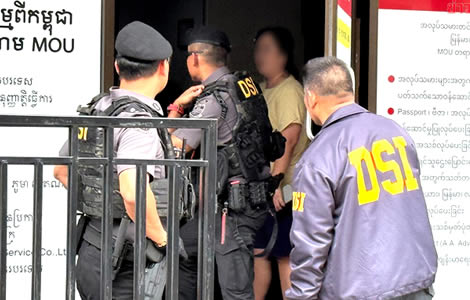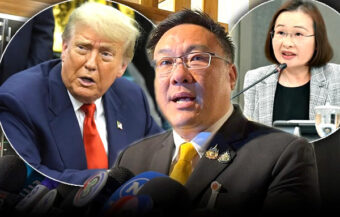The Chairman of the Thai Chamber of Commerce, Kalin Sarasin, called on the government on Monday to urgently begin negotiations with the United States over the sudden move to drop preferential status for up to 573 types of Thai exports to the United States which will see them levied with a tariff ranging from 1% to 5% from April 25th 2020. The private business leader believes that the impact on Thai exports will be significant, extensive and will severely impact key companies operating in Thailand.
There have been conflicting responses to the US suspension of duty-free status for a range of Thai exports that was announced on Saturday by the US President in a letter to Congress in Washington DC. Senior officials at the Ministry were reported as claiming on Monday that the move will have only a marginal impact. The Ministry, of course, said the same in 2018 at the outset of the US-China trade war which along with the rising Thai baht has devastated Thai export growth this year leading to a projected contraction of 5.3%. There is also some debate, despite the formal position, as to whether the move is linked to the controversial pesticide ban and a long-running issue with Thailand’s ban on US feed additives in pork. One thing should be clear, this is a new front opened by the US administration in its bullish attitude towards markets closed to US firms across the world. It is a trade war and will escalate further if Thai authorities fail to grasp that nettle.

There has been a mixed reaction in Thailand to the decision announced by President Trump on Friday to lift duty-free status on a range of Thai exports under the US Generalised System of Preferences.
Senior ministry official claims 0.01% impact on Thai exports from the move
On Sunday, Pimchanok Vonkorpon who is the director-general of the Trade Policy and Strategy Office of the Ministry of Commerce told reporters that the impact on Thailand’s exports would be quite minuscule affecting only 0.01% of its overall trade with the world. The ministry official explained that the change in Thailand’s status would affect 355 out of 573 different types of product exported to the United States with a total value of $1.28 billion or ฿39 billion. These exports will be subjected to additional tariffs or duties ranging from 1% to 5% from the end of April 2020.
Calculations suggest only 2.6% of affected trade will be lost after tariffs of 1% to 5% are applied
As a result, the senior official calculated that the loss to Thailand export trade will be somewhere between $29 million and $33 million or ฿884 million to over ฿1 billion. To put it in other terms, the ministry official suggests that only 2.6% of the affected trade will be lost because of the higher duties and consequently the higher cost to American importers by the move. It seems an optimistic assessment but neither can the ministry be seen to be in the business of talking down Thailand’s export prospects.
Thai Union boss says his firm not be impacted
The official’s position was supported somewhat by Thiraphong Chansiri, the Chief Executive of the Thai Union Group which is one of Thailand’s largest exporters to the United States. ‘At this time, I do not foresee this decision by USTR having an impact on our business,’ he said.
The company implemented a series of reforms in 2015 and has been widely acknowledged for its commitment to high standards of human rights and sustainability in its supply chains.
Thai Union, for instance, topped the Dow Jones Sustainability Indices for the second year in a row when they were published in September. The company and its key executives have won numerous awards for its progressive approach to doing business where the key focus is on building trust.
On Monday the Thai Stock Exchange dropped by nearly 1% on reaction to the news
On Monday, the SET index of Thai shares was down nearly 1% at one point with Thai Union itself off 4% as the domestic market responded to the news which only filtered through on Saturday.
University professor says up to one-third of Thailand’s exports to the US could be impacted
One expert who takes a more concerned view of the move is Associate Professor Dr Aat Pisanwanich who is the Director for International Trade Studies at the University of the Thai Chamber of Commerce. He fears that up to a third of Thailand’s nearly ฿ 1 trillion export market to the United States may be impacted by the move.
Not convinced by the reason given for the move
He is also not convinced of the reason given for the sudden decision. He has urged the Thai government to seek a full explanation and clarification. ‘It doesn’t make sense that the US cited Thailand’s failure to improve its labour rights to meet international standards, as the government already raised the rights and freedom of alien workers to match those of local workers a long time ago.’ he said.
Many still suspect it is linked to the pesticide ban
This view is shared by many who are still convinced that the move is designed to bring pressure to bear on Thai authorities over the recent pesticide ban which will damage US imports into Thailand as outlined in a letter sent by senior US officials days before the ban was confirmed on October 22nd.
The announcement has also prompted concern that the move may now be part of a wider trade spat that is opening up between Thailand and the United States.
April 2018 – US National Pork Council petitioned Congress over Thailand’s ban of a feed additive
One of two submissions to Congress on trade with Thailand came in April 2018 when the powerful US lobby group, the National Pork Council, bitterly complained about Thailand’s ‘de facto’ closed market to US pork products.
The matter was raised in February this year by Karl Ehlers, an assistant US trade representative for Southeast Asia and the Pacific. Coincidentally the trade representative also raised the issue of workers rights and union representation for foreign workers in Thailand at the same time with the then Thai Commerce Minster Chutima Bunyapraphasara.
Filed for review of Thailand’s status over ‘de facto’ block on pork exports to Thailand
The National Pork Council in the United States filed the formal request for the suspension of Thailand’s preferential status. It complained about Thailand’s ban on the feed additive ractopamine used extensively by US pig farmers to increase the yield on US pork products.
The lobby group has complained that Thailand effectively bans US pork with this prohibition ostensibly based on human health fears.
It must be observed that this additive is also banned in most countries worldwide, including the European Union. There are concerns, widely held, about the health impact on human beings of the additive including reports that can cause heart problems.
Such claims are refuted by US authorities and US scientists. The additive is cleared for use in Japan and South Korea but barred in over 160 countries in the world including Thailand.
In a published report late last year, the US National Pork Council highlighted that Thailand only imported 68 tons of US pork into the kingdom in 2016 in a year when 1 million tonnes of pork was consumed in the Thai market.
Commerce Minister quotes formal reason for the move to remove Thailand’s status
On Monday, the Thai Commerce Minister and Deputy Prime Minister Jurin Laksanawisit pointed out that the formal reason given for the ban is the US review on workers rights in Thailand when pressed by reporters as to whether it relates to the pesticide ban.
US embassy also clarifies that the reason is trade union representation for foreign workers
This was echoed by Jillian Bonnardeaux of the US Embassy in Bangkok who said the move resulted from the closure of a review that had been underway for 6 years having being lodged in 2013 by AFL-CIO representing the US trade union movement. This was followed by the formal call to suspend Thailand’s staus by the National Pork Council in 2018.
‘Our hope is that in announcing this action, we will incentivise Thailand to move forward with legislation and administrative enforcement actions related to worker rights that could lead to a reversal of the GSP action we are taking today,’ she said.
The Donald Trump factor and arbitrary nature of trade decisions – politics and money
This explanation would be the end of the matter were it not for the diplomatic record of US President Donald Trump who has often emphasised that he wanted to see progress on reducing Thailand’s $20 billion trade surplus with the United States.
The Thai Commerce Minister pointed out on Monday that Thailand can petition the US to have the suspension lifted. This serves to highlight the arbitrary nature of these mechanisms as is also the case with Thailand’s trade restrictions on US pork and chemicals.
This is a matter of politics and money except that the political situation for Thailand’s leadership leaves little room to manoeuvre just as the Mexican leadership faced a similar outcry recently over immigration but were forced to climb down.
Thailand, of course, is very different.
US pork group considers Thai ban on controversial feed additive as ‘unscientific’
In the United States, the National Pork Council has been campaigning for the suspension of Thailand’s preferential status which came through on Saturday morning based on Thailand’s ban on its pork products because of Ractopamine which it considers as non-scientific and in violation of World Trade Organisation rules. The Thai side has countered with exactly the opposite point of view.
It essentially boils down to politics, money and trade war as the US and its 45th President pushes for more market access.
Trump is rankled not only by the denial of access for American products but anything considered an affront to the status of the world superpower. This is ‘make America great again’ in action and the pesticide ban which impacts $1.7 billion of US exports to Thailand, being confirmed 4 days after high-level US government representations to the Thai government at the most senior level cannot have helped.
Chairman of the Thai Chamber of Commerce urges prompt negotiation with the Americans
Meanwhile, Kalin Sarasin, the Chairman of the Thai Chamber of Commerce on Monday urged the Thai government to begin talks and negotiations with Washinton over the move.
His view was that the ban would have a significant and extensive impact on Thailand’s exports and also on some industry operating within the kingdom. ‘The private sector is studying the possible impacts on its respective industries, as they fear the GSP suspension will affect both Thai-owned and foreign companies located in Thailand,’ he warned.
Further reading:
Farmers pesticide ban may have repercussions for PM either way ahead of the crunch decision
Thailand’s economy impacted by the whims of the US President as much as its political future in 2019


















